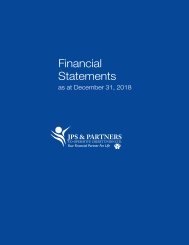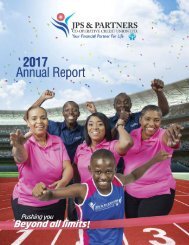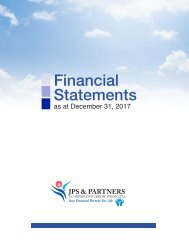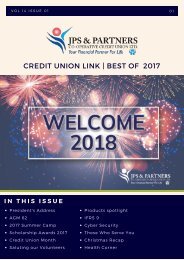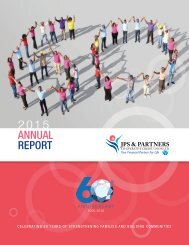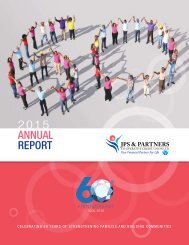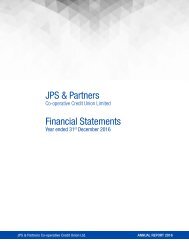JPS & Partners - Financial Statements 31st December2018 (4.4.19)
Create successful ePaper yourself
Turn your PDF publications into a flip-book with our unique Google optimized e-Paper software.
Page 1b<br />
REPORT OF THE INDEPENDENT AUDITORS<br />
TO THE REGISTRAR OF CO-OPERATIVES<br />
AND FRIENDLY SOCIETIES<br />
RE <strong>JPS</strong> & PARTNERS CO-OPERATIVE CREDIT UNION LIMITED<br />
(A SOCIETY REGISTERED UNDER THE CO-OPERATIVE SOCIETIES ACT)<br />
Auditors’ Responsibilities for the Audit of the <strong>Financial</strong> <strong>Statements</strong><br />
Our objectives are to obtain reasonable assurance about whether the financial statements as a whole are<br />
free from material misstatement, whether due to fraud or error, and to issue an auditor’s report that<br />
includes our opinion. Reasonable assurance is a high level of assurance, but is not a guarantee that an<br />
audit conducted in accordance with ISA’s will always detect a material misstatement when it exists.<br />
Misstatements can arise from fraud or error and are considered material if, individually or in the aggregate,<br />
they could reasonably be expected to influence the economic decisions of users taken on the basis of these<br />
financial statements.<br />
As part of an audit in accordance with ISAs, we exercise professional judgement and maintain professional<br />
skepticism throughout the audit. We also:<br />
▪<br />
Identify and assess the risks of material misstatement of the financial statements, whether due to fraud<br />
or error, design and perform audit procedures responsive to those risks, and obtain audit evidence that<br />
is sufficient and appropriate to provide a basis for our opinion. The risk of not detecting a material<br />
misstatement resulting from fraud is higher than for one resulting from error, as fraud may involve<br />
collusion, forgery, intentional omissions, misrepresentations, or the override of internal control.<br />
▪<br />
▪<br />
▪<br />
▪<br />
Obtain an understanding of internal control relevant to the audit in order to design audit procedures that<br />
are appropriate in the circumstances, but not for the purpose of expressing an opinion on the<br />
effectiveness of the Credit Union's internal control.<br />
Evaluate the appropriateness of accounting policies used and the reasonableness of accounting<br />
estimates and related disclosures made by management.<br />
Conclude on the appropriateness of management's use of the going concern basis of accounting and,<br />
based on the audit evidence obtained, whether a material uncertainty exists related to events or<br />
conditions that may cast significant doubt on the Credit Union's ability to continue as a going concern. If<br />
we conclude that a material uncertainty exists, we are required to draw attention in our auditor's report to<br />
the related disclosures in the financial statements or, if such disclosures are inadequate, to modify our<br />
opinion. Our conclusions are based on the audit evidence obtained up to the date of our auditor's report.<br />
However, future events or conditions may cause the Credit Union's to cease to continue as a going<br />
concern.<br />
Evaluate the overall presentation, structure and content of the financial statements, including the<br />
disclosures, and whether the financial statements represent the underlying transactions and events in<br />
a manner that achieves fair presentation.<br />
We communicate with those charged with governance regarding, among other matters, the planned scope<br />
and timing of the audit and significant audit findings, including any significant deficiencies in internal control<br />
that we identify during our audit.







